Select Language

BEIJING (Reuters) -China's consumer inflation accelerated to its fastest in five months in January while producer price deflation persisted, reflecting mixed consumer spending and weak factory activity.
Deflationary pressures are likely to persist in China this year, analysts say, unless policymakers can rekindle sluggish domestic demand, with tariffs by U.S. President Donald Trump on Chinese goods adding pressure on Beijing to spur growth in the world's second-largest economy.
The consumer price index rose 0.5% last month from a year earlier, quickening from December's 0.1% gain, data from the National Bureau of Statistics showed on Sunday, above the 0.4% rise estimate in a Reuters poll of economists.
Core inflation, excluding volatile prices for food and fuel, sped up to 0.6% in January from 0.4% the previous month.
Although consumer prices are expected to rise gradually, producer prices are unlikely to return to positive territory in the short term as overcapacity in industrial goods persists, said Xu Tianchen, senior economist at the Economist Intelligence Unit.
"If measured by the GDP deflator, it will still take a few quarters to get out of deflation, " Xu said.
The numbers were skewed by seasonal factors, as the Lunar New Year, China's biggest annual holiday, began in January this year versus February last year. Typically, prices rise as consumers stockpile goods, particularly food for big family gatherings.
Prices of airplane tickets rose 8.9% from a year earlier, tourism inflation was 7.0% and movie and performance ticket prices rose 11.0%.
Consumer spending reports over the holidays were mixed, reflecting worries over wage and job security.
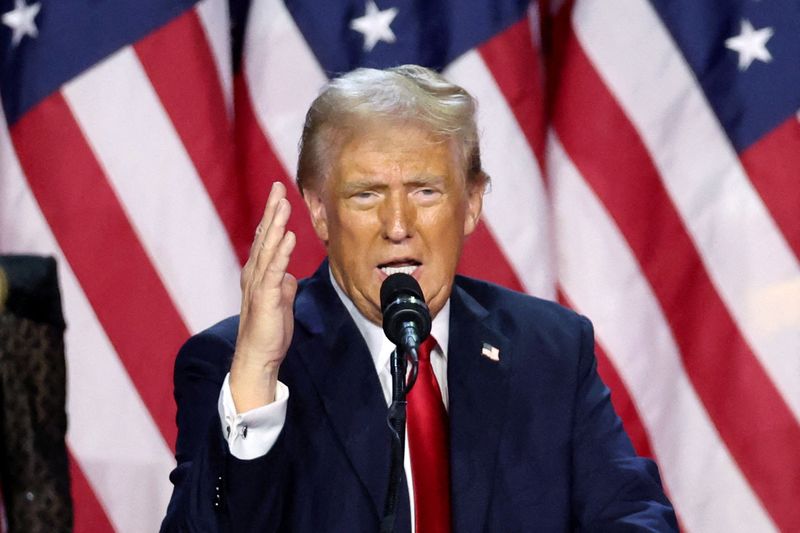
Investing.com-- U.S. President Donald Trump said on Sunday that he will announce additional 25% tariffs on all steel and aluminum imports into the U.S., and will also announce reciprocal duties over what he sees as unfair trading practices.
Speaking to reporters on Air Force One, Trump said he will announce the 25% tariffs on Monday, and will announce the reciprocal tariffs on Tuesday or Wednesday, with both duties to be effective immediately.
The president was on his way to the NFL Super Bowl in New Orleans- a route that saw him fly over the Gulf of America, which the president had recently renamed from the Gulf of Mexico.
Trump on Sunday also signed an executive order recognizing February 9 as “Gulf of America Day.”
Trump’s tariff threat comes just days after his 10% duties against China took effect, as the U.S. president uses tougher trade policy to push through his broader international agenda. Beijing had retaliated with a slew of measures and duties.
He had threatened 25% tariffs against Canada and Mexico over stricter border control, but had postponed the tariffs on assurances from the two countries.
Canada, Brazil, Mexico, South Korea, and Vietnam are the biggest exporters of steel to the U.S., government data showed.
Canada is also by far the biggest exporter of aluminum to the U.S.
Trump had in his first term imposed 25% tariffs on steel and 10% tariffs on aluminum, but had later granted duty-free quotas to allies such as Canada, Mexico, and Brazil.
On reciprocal tariffs, Trump said he will hold a conference later this week to provide more information on reciprocal trade tariffs- plans for which he had first revealed on Friday.
The president has consistently criticized uneven import duties imposed by other countries on U.S. goods. He has long criticized the European Union’s 10% tariffs on U.S. auto imports, which is much higher than the 2.5% import duty charged by the U.S.
Analysts and Federal Reserve officials have expressed some concerns that Trump’s trade tariffs- which will be borne by U.S. importers, will push up inflation in the coming months.
U.S. stock index futures crept lower after Trump’s announcement.

Investing.com-- Gold prices rose in Asian trade on Friday, remaining in sight of recent record highs as traders favored safe havens amid uncertainty before key U.S. nonfarm payrolls data.
The yellow metal was set for strong weekly gains as a renewed trade war between the U.S. and China spurred haven demand, while weakness in the dollar also helped.
Fears of renewed tensions in the Middle East, after U.S. President Donald Trump claimed that the U.S. would take over the Gaza strip, also fueled some haven demand for gold.
Spot gold rose 0.2% to $2,862.67 an ounce, while gold futures rose 0.3% to $2,884.81 an ounce by 00:58 ET (05:58 GMT). Spot prices were up 2.4% this week.
Citi and UBS analysts hiked their gold price forecasts for 2025, stating that the yellow metal was likely to extend its bull market through the rest of the year. Citi sees gold hitting $3,000 an ounce in the short-term, while UBS expects $3,000 an ounce by end-2025.
Gold upbeat ahead of nonfarm payrolls data
Spot prices remained close to a record high of $2,882.35 an ounce, as weakness in the dollar underpinned the yellow metal.
But the dollar steadied on Friday, with focus turning to key nonfarm payrolls data due later in the day.
Traders were bracing for a strong payrolls reading, especially amid signs of continued resilience in the labor market. A strong labor market gives the Federal Reserve less impetus to cut interest rates.
The central bank recently signaled that it had no plans to cut interest rates quickly, amid uncertainty over sticky inflation and Trump’s policies.
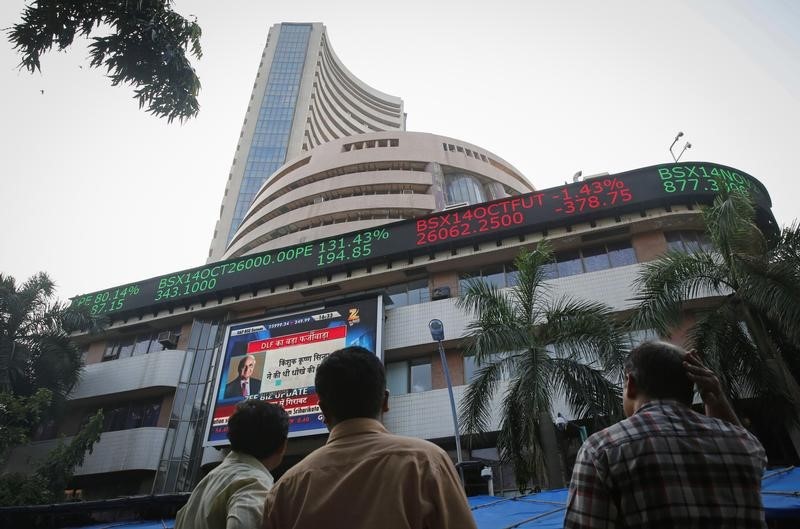
Investing.com– Most Asian stocks fell on Friday but Chinese shares extended gains on AI optimism despite U.S. tariffs, while focus turned to the Reserve Bank of India’s interest rate decision due later in the day.
U.S. stock index futures were largely unchanged in Asian trading after a mixed close on Wall Street.
RBI rate decision in focus; Asian central banks see pre-emptive rate cuts
The RBI will decide on its interest rates and cash reserve ratio later in the day.
Economists widely expect the central bank to cut the benchmark repo rate by 25 basis points to 6.25%, marking the first rate reduction since May 2020.
India’s Nifty 50 Futures signaled a positive start at the open.
Recent domestic data showed that India's retail inflation eased to a four-month low of 5.2% in December, but was still above the RBI's medium-term target of 4%.
On the growth front, India's economy is projected to expand at 6.4% in the current fiscal year, a slowdown from the 8.2% growth recorded in the previous year.
These factors, coupled with growing uncertainty around U.S. policies, have bolstered bets for a rate cut.
“Due to uncertainty surrounding tariffs and external demand, Asian central banks are becoming more cautious about the domestic growth outlook, leading to pre-emptive rate cuts.” ING analysts said in a recent note.
Recently, Singapore eased monetary policy for the first time in almost five years, while Indonesia saw unexpected rate cuts.
China stocks rise bucking the regional trend
Despite the imposition of 10% tariffs by the Donald Trump administration on Chinese goods, China's AI sector, led by companies like DeepSeek, has demonstrated resilience, bolstering investor confidence.
China’s Shanghai Composite rose 0.8% on Friday, while the Shanghai Shenzhen CSI 300 index jumped 1%. Hong Kong’s Hang Seng index advanced 0.9%.
Hong Kong-listed Lenovo Group (HK:0992) jumped 7.5%, while Xiaomi (OTC:XIACF) Corp (HK:1810) rose 4.8%.
Elsewhere, most regional stocks were lower amid global uncertainty around Donald Trump’s policies, keeping investors away from riskier assets.
Indonesia’s Jakarta Stock Exchange Composite Index slumped 1.7%, while Thailand’s SET Index declines 1.9%
Japan’s Nikkei 225 lost 0.5% while TOPIX fell 0.4%.
South Korea's KOSPI index was 0.3% weaker, while Singapore's Straits Times Index was largely unchanged.
Australia's S&P/ASX 200 index advanced 0.4%.
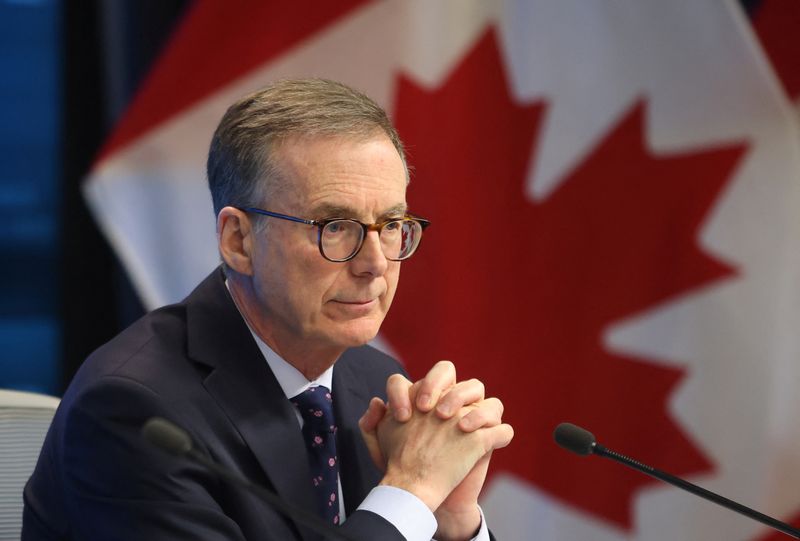
By Promit Mukherjee
OTTAWA (Reuters) -Bank of Canada Governor Tiff Macklem said on Thursday a policy shift in the U.S. was causing uncertainty and President Donald Trump's tariff threats were already impacting businesses and households.
Trump agreed on Monday to temporarily pause a 25% levy on almost all imports from Canada and Mexico, which if implemented could have pushed the economies of both the countries into a whirlwind of recession and higher prices.
The tariffs have been suspended for a month, the U.S. government said this week.
"Trump's threats of new tariffs are already affecting business and household confidence, particularly in Canada and Mexico," Macklem said while virtually addressing a conference held in Mexico City.
"The longer this uncertainty persists, the more it will weigh on economic activity in our countries," he said.
The Bank of Canada said last month the threat of tariffs was making economic projections difficult, but cautioned that a 25% tariff could cause major economic damage.
In his prepared remarks on Thursday, Macklem said if significant broad-based tariffs were imposed, they would reduce long-run prosperity, which monetary policy cannot change.
But besides the looming tariffs, other headwinds were also posing challenges for monetary policy such as prospects of war, rising trade protectionism, economic fragmentation, the advent of new technologies and catastrophic weather events, he said.
"In a world with more structural change and more negative supply shocks, central banks will be faced with harder choices," Macklem said, adding that all of the challenges make central banks vulnerable to criticism.
"We will be called ineffective or criticized for not doing enough. And some will challenge our independence," he said.
The Bank of Canada was criticized during the pandemic when market participants and politicians blamed its monetary policy measures for failing to tame recession and joblessness.
In a report published last month on the review of steps it had taken during the pandemic, the bank said it would improve its communications and its forecasting models to predict future shocks.
Macklem said amid an uncertain world, central bankers will have to rely on their strategies to maintain price stability, communicate clearly on the limitations of monetary policy, create advanced modeling and work collaboratively with other central banks.
"We need to remain evidence-based, technocratic and professional, and free of political influence," he said.
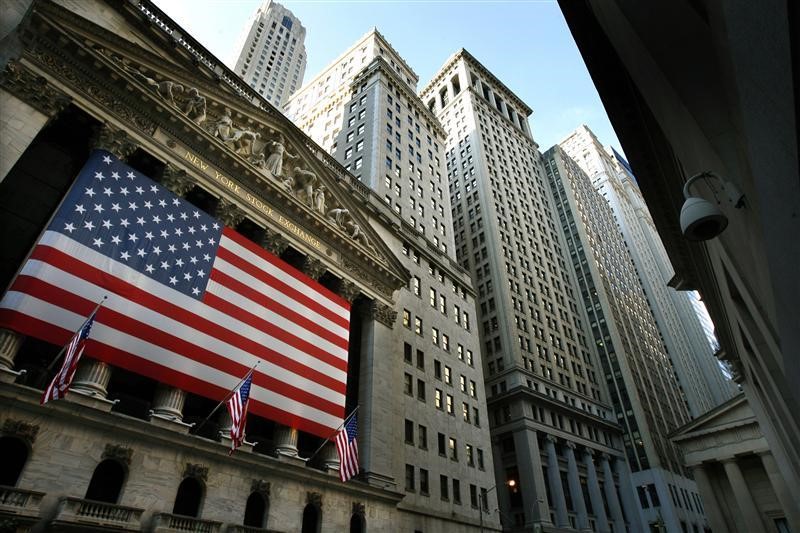
Investing.com-- The S&P 500 closed higher for third-straight day on Thursday, but investors had to contend with stocks swinging between gains and losses intraday on a deluge of corporate earnings and economic data ahead of the crucial monthly jobs report due Friday.
At 4:00 p.m. ET (21:00 GMT), the S&P 500 index rose 0.3%, the NASDAQ Composite gained 0.5%, and the Dow Jones Industrial Average fell 125 points, or 0.30%.
Jobless claims rise; nonfarm payrolls eyed.
The number of Americans applying for first-time unemployment benefits edged up by more than expected last week, consistent with a slowing -- albeit slowly -- labor market.
Initial jobless claims came in at 219,000 in the week ended on Feb. 1. The prior week's figure was slightly revised higher by 1,000 to 208,000, while economists had expected a reading of 214,000.
The data comes ahead of the release of the all-important nonfarm payrolls report for January on Friday, which should provide a glimpse into labor demand that is closely monitored by Federal Reserve policymakers. Economists are predicting that the US economy added 169,000 jobs last month, down from 256,000 in December.
Earlier this week, separate data have shown that private payrolls expanded in January, while job openings slipped by the most in 14 months. However, resilient hiring and a relatively low level of layoffs has suggested that the labor market is not entering a sudden downturn, bolstering the case for the Fed to leave interest rates unchanged until at least June.
Quarterly earnings continue; Amazon reports after the closing bell
E-commerce giant Amazon (NASDAQ:AMZN) is due to headline a slew of quarterly returns on Thursday, after the close.
Like its Big Tech peers, the company is expected to face fresh questioning from analysts about its artificial intelligence spending plans following DeepSeek's rise to prominence.
This week, Alphabet (NASDAQ:GOOG) announced a capital spending outlook in 2025 that exceeded Wall Street estimates, partly sparking a downturn in the search giant’s stock price on Wednesday. Executives at Facebook-owner Meta Platforms (NASDAQ:META) and software titan Microsoft (NASDAQ:MSFT) have also defended their own massive AI expenditures, arguing that they are necessary to keep up in the race to monetize the technology.
Elsewhere, Eli Lilly (NYSE:LLY) stock rose more than 3% after the drugmaker posted a surge in fourth-quarter revenue thanks in part to a spike in demand for its obesity treatment Zepbound.
Yum! Brands (NYSE:YUM) stock soared over 9% after the fast food holding company surpassed estimates for fourth-quarter comparable sales, as value offerings from Taco Bell attracted budget-conscious US consumers to the popular Tex-Mex chain.
Tapestry (NYSE:TPR) stock jumped 12% after the fashion holding company raised its 2025 guidance and reported better-than-expected second-quarter results.
Ford (NYSE:F) stock fell over 7% after the auto giant forecast weaker annual profit at a time when the threat of US tariffs on Canada and Mexico, which have been temporarily paused, continues to stoke uncertainty.
Qualcomm, Arm , Skyworks slump to pressure chips
Qualcomm (NASDAQ:QCOM) stock slid more than 3% after the chipmaker forecast no revenue growth for its lucrative patent licensing business in 2025 after its license with China’s Huawei expired. The segment was expected to represent another leg of growth for the company.
Arm Holdings (NASDAQ:ARM) sank over 3% after its earnings outlook for the current quarter was in line with expectations, denting hopes that AI demand will spur outsized sales for the chip designer.
Skyworks Solutions Inc (NASDAQ:SWKS), which makes chips for consumer electronics such as smartphones, fell 24% after warning that it expects Apple (NASDAQ:AAPL) to reduce demand for its parts to be used in the upcoming iPhone 17 cycle.
(Peter Nurse, Ambar Warrick contributed to this article.)
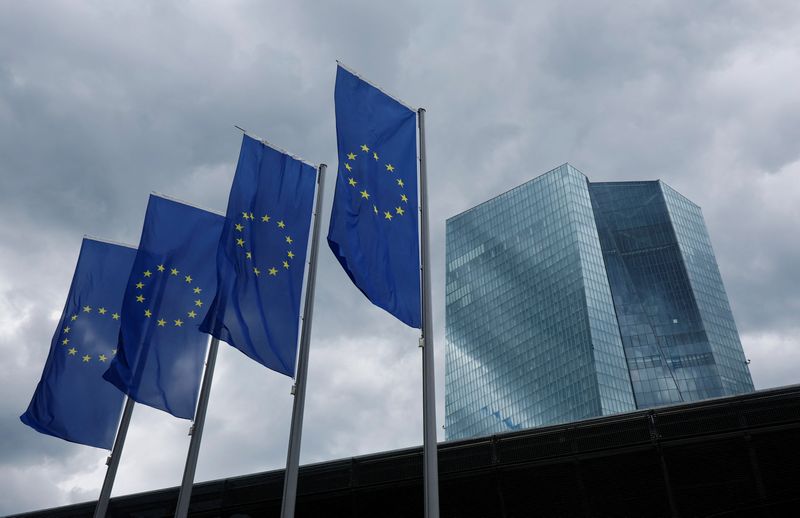
By Balazs Koranyi and Francesco Canepa
FRANKFURT (Reuters) - European Central Bank interest rates have room to fall further as inflation moderates, ECB board member Piero Cipollone said, warning that the U.S. administration's trade war with China could have a detrimental impact on the 20-member euro zone.
The ECB has lowered borrowing costs five times since June as growth concerns start to trump price worries, and investors see at least three more rate cuts this year in a bid to boost an economy struggling to rebound from two years of near stagnation.
"We all agree there is still room for adjusting rates downwards," Cipollone told Reuters in an interview. "We are almost on target...(and) we are still in restrictive territory."
But higher energy prices and global trade tensions are tugging the ECB in different directions, so there is no sense in committing to any specific move for now, including a widely anticipated and fully priced in cut in March, Cipollone added.
Still, the euro zone economy has not fundamentally changed since December, when the ECB's projections assumed four rate cuts in 2025, including a move already delivered in a unanimous decision last month.
"The overall understanding of where we are going is there, the fundamentals haven’t changed, so I do not expect a big change in direction," Cipollone said. "This convergence with the inflation target is coherent with a declining interest rate path."
Inflation inched up to 2.5% last month but the ECB sees it back at 2% sometime this summer after four years above target.
CHINA RISK
The big uncertainty is U.S. trade policy and that could hit Europe hard, even before any direct trade barriers on the bloc, Cipollone argued.
"What concerns me more is if President Trump engages in a full trade war with China," Cipollone, the newest member of the ECB's board, added. "This is a more serious threat because China has 35% of the world’s manufacturing capacity."
The U.S. imposed a 10% tariff on all Chinese imports this week, prompting retaliatory measures from Beijing.
Curtailing access to the U.S. would force China to find other markets and it could dump discounted products on Europe, curbing growth and prices, Cipollone said.
Models compiled by the Peterson Institute for International Economics, a Washington-based think tank, concluded that while the imposition of tariffs would see the U.S. itself take a hit to growth, it would suffer less than any of its targets.
However, Cipollone appeared to downplay the impact of potential tariffs directed at Europe.
He said firms could absorb some of the higher costs by sacrificing profit margin while the euro's inevitable weakening against the U.S. dollar would also buffer the bloc.
Trade strife could drag economic growth down but not enough to induce a recession, especially since other parts of the economy are showing resilience.
Cipollone noted that the labour market is holding up, consumption is likely to rebound, construction is strong, rate cuts are feeding through to the economy and even industry, in recession for the past two years, is showing signs of bottoming out.
"We might not be booming but I am not expecting a recession at all," he said.
Even if trade tensions threaten to drag inflation lower, other factors, particularly energy costs, were pulling prices in the other direction, so risks to the outlook remained balanced, even if some policymakers fear the ECB could undershoot its target.
Click here for the full Q&A of the interview.
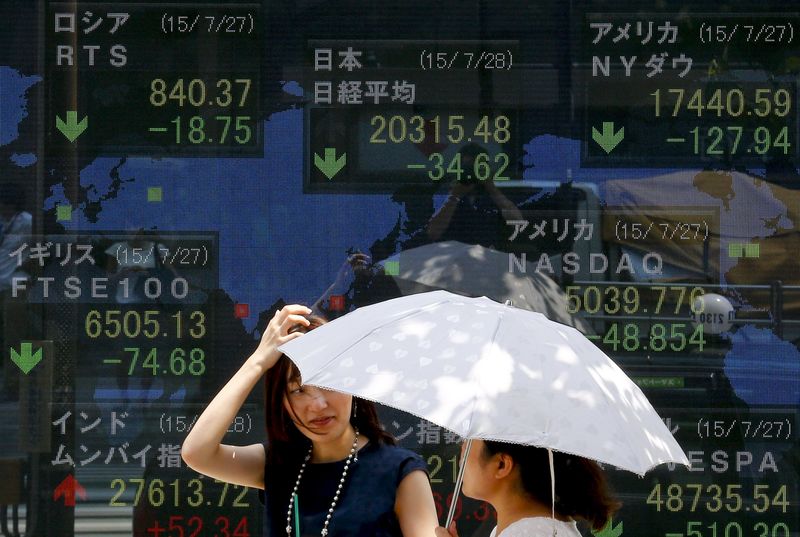
Investing.com– Most Asian stocks were higher on Thursday as the broader tech sector rose tracking Wall Street gains, though escalating U.S.-China trade tensions tempered overall optimism.
U.S. stock index futures edged higher in Asian trade after Wall Street saw gains in tech stocks after NVIDIA (NASDAQ:NVDA) forecasted solid capital spending on artificial intelligence.
Tracking their peers, heavyweight Asian tech stocks were also on the rise, leading to broad-based gains in the region.
Regional tech stocks jump on AI optimism
Despite the imposition of 10% tariffs by the Donald Trump administration on Chinese goods, China's AI sector, led by companies like DeepSeek, has demonstrated resilience, bolstering investor confidence.
The enthusiasm surrounding DeepSeek has been a key factor in offsetting concerns related to the ongoing trade tensions between the U.S. and China.
As a result, China’s Shanghai Composite rose 0.8% on Thursday, while the Shanghai Shenzhen CSI 300 index gained 0.7%. Hong Kong’s Hang Seng index advanced 0.4%.
Hong Kong-listed Semiconductor Manufacturing International Corp (HK:0981) (SMC) shares hit their record high, while Sunny Optical (OTC:SNPTF) Technology (HK:2382) stock jumped 6.1%.
In Tokyo, the Nikkei 225 gained 0.3%. Semiconductor giant Tokyo Electron (TYO:8035) saw its shares climb 1.8%, while Sony Corp (TYO:6758) added 1.2%.
Renesas Electronics Corp (TYO:6723) surged 12% following robust earnings for the December quarter.
South Korea's KOSPI index rose 0.5%, with Samsung Electronics (KS:005930) and SK Hynix Inc (KS:000660) adding 1.1% and 2.7%, respectively.
US-China tariff concerns persist, limiting gains
However, the upside was limited as investors remained cautious ahead of the implementation of China's retaliatory tariffs on U.S. imports, set to take effect next week.
The ongoing trade tensions have prompted global investors to adopt a more cautious stance toward riskier assets.
Singapore's Straits Times Index gained 0.4%, buoyed by strong performances in the financial and technology sectors.
Singapore Exchange Ltd (SGX:SGXL) reported a 27% rise in its half-yearly profit on Thursday. The bourse operator’s stock rose nearly 1%.
Elsewhere, India's Nifty 50 Futures were largely muted on Thursday.
Australia's S&P/ASX 200 index advanced 0.7%, with technology and mining stocks leading gains.
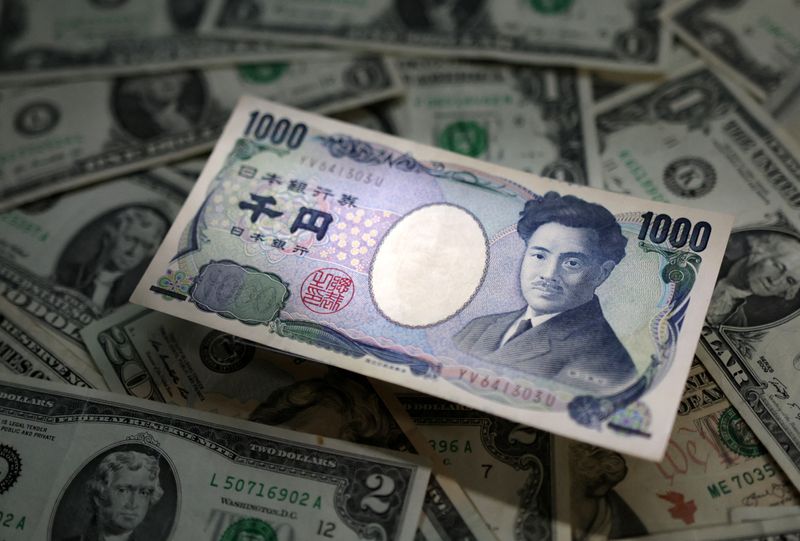
By Kevin Buckland
TOKYO (Reuters) - The U.S. dollar slumped to an eight-week trough to the yen and lingered near a one-month low versus sterling on Thursday, as investor nerves about an inflation-stoking global trade war abated.
Japan's currency was also supported by rising expectations for further Bank of Japan interest-rate hikes with a central bank official advocating continued rate hikes, a day after strong wage data.
Sterling was firm even with the Bank of England widely expected to cut rates by a quarter point later in the day.
The dollar sank 0.5% to 151.81 yen by 0140 GMT, the lowest since December 12, adding to a 1.1% slide on Wednesday.
Sterling was steady at $1.2509, after rising as high as $1.2550 in the previous session for the first time since January 7.
The euro was flat at $1.0401 after edging up 0.2% on Wednesday.
The dollar index - which measures the U.S. currency against the euro, sterling, yen and three other major peers - stood at 107.57, not far from its overnight low of 107.29.
The index had jumped to a three-week high of 109.88 at the start of the week as Trump looked poised to impose 25% import tariffs on Mexico and Canada, but the countries won last-minute, one-month reprieves - although Washington did slap 10% tariffs on China.
The offshore yuan strengthened slightly to 7.2775 per dollar.
Canada's loonie was steady at C$1.4321 versus its U.S. counterpart after rising to the highest since December 17 at C$1.4270 overnight. The Mexican peso was steady at 20.5789 per dollar.
"It appears that the market has started to put the tariff threats against Mexico and Canada in the rear view mirror and is treating the China tariffs as business as usual," said James Kniveton, a senior corporate FX dealer at Convera.
"Two (U.S.) rate cuts are still anticipated by the end of the year, but with the diminishing likelihood of tariffs contributing to inflation, there appears to be greater flexibility for the Federal Reserve."
The next major test for the U.S. monetary policy outlook is monthly payrolls figures due Friday.
A quarter-point Fed cut is fully priced for July, with markets expecting 46.3 basis points of cuts by the December meeting, according to LSEG data.
Meanwhile, market-implied odds for an imminent BoE rate reduction stand at 92%. For the BOJ, the market has priced in around 94.8% odds for a quarter-point hike by September.
BOJ board member Naoki Tamura said on Thursday that the central bank must raise rates to at least 1% or so in the later half of fiscal 2025 with upward risks to prices rising.
A day earlier, data showed a second-straight month of growth for real wages.
(This story has been corrected to say basis points, not percentage points, in paragraph 14)
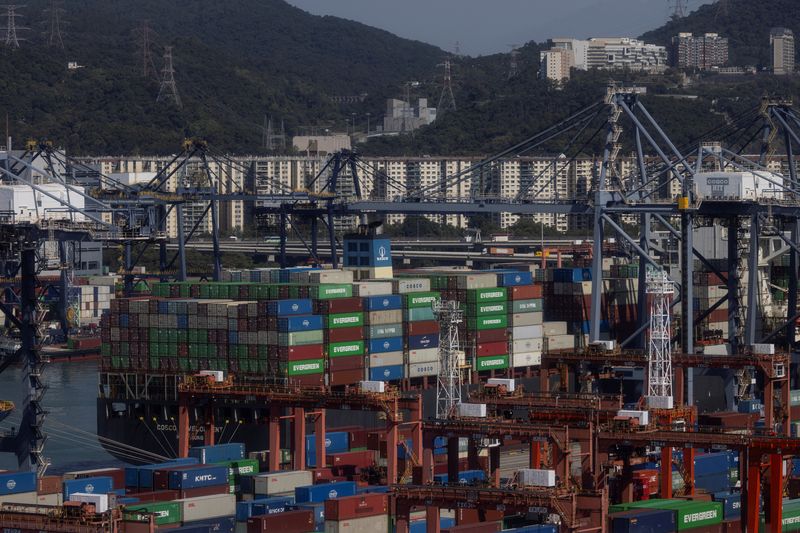
By David Lawder
WASHINGTON (Reuters) - China filed a World Trade Organization complaint on Wednesday against U.S. President Donald Trump's new 10% tariff on Chinese imports and his cancellation of a duty-free exemption for low-value packages, arguing the actions are "protectionist" and break WTO rules.
Beijing's request for U.S. trade consultations came as confusion reigned among shippers and retailers over Trump's closure of the "de minimis" exemption for package imports valued under $800 and widely used by e-commerce firms including Shein, Temu and Amazon (NASDAQ:AMZN).
A Customs and Border Protection official said all small packages from China and Hong Kong needed to have customs entries on file prior to arrival and there was the potential for some cargo to be sent back without this paperwork.
The WTO said China submitted a request for consultations with the U.S. on the tariffs. China argues in the document that Trump's new duties aimed at halting the flow of fentanyl opioids and their precursor chemicals to the U.S. "are imposed on the basis of unfounded and false allegations concerning China."
It said the duties are discriminatory, only applying to goods of Chinese origin, and are inconsistent with the U.S.'s WTO obligations.
The request for consultations is the start of a dispute process that could lead to a ruling that Trump's duties violated trade rules in the same manner that a 2020 WTO ruling found that his first-term China tariffs broke trade regulations.
But such a victory would be unlikely to bring Beijing relief because the WTO's Appellate Body has been largely inoperable for years, as the U.S. has blocked the appointment of appellate judges over what it views as judicial overreach by the body. This has prohibited a final decision in the 2020 case.
PACKAGE CHAOS
The U.S. Postal Service said on Wednesday it would again accept parcels from China and Hong Kong, reversing a temporary suspension that threatened to disrupt millions of package imports every day.
"We're all running around like headless chickens at this moment in time, trying to second-guess what's going to happen," said Martin Palmer, co-founder of Hurricane Commerce, a cross-border e-commerce data provider. "And in two weeks' time we may be back to normal."
The Trump administration has blamed the de minimis exemption for allowing fentanyl and its precursor chemicals to enter the U.S. unscreened. Recent Reuters reporting has also found that drug traffickers are exploiting the exemption.
USPS said in a statement it was working with the U.S. Customs and Border Protection agency to implement an efficient collection mechanism for the new China tariffs to minimize disruptions to deliveries.
NO TRUMP-XI TALKS
On Wednesday, there was still no call scheduled between Trump and Chinese President Xi Jinping to discuss the new U.S. tariffs and Beijing's retaliatory measures, a person familiar with the matter told Reuters.
Trump said on Tuesday he was in no hurry to speak with Xi as the tariff took effect just after midnight Eastern Time.
China responded with targeted tariffs on imports of U.S. coal, liquefied natural gas, crude oil and farm equipment, and opened an anti-monopoly investigation into Alphabet (NASDAQ:GOOGL)'s Google.
The launch of the new trade war caught the retail and shipping sectors flat-footed.
"There has really been absolutely zero time for anyone to prepare for this," said Maureen Cori, co-founder of New York-based consultancy Supply Chain Compliance. "What we really need is direction from the government on how to handle this without warning or notice."
Currently, de minimis parcels are consolidated so customs can clear hundreds or thousands of shipments at once, but they will now require individual clearances, significantly increasing the burden for postal services, brokers and customs agents, Cori said.
The provision was initially intended as a way to streamline trade, and its use has surged with the increase in online shopping.
About 1.36 billion shipments entered the United States using the de minimis provision in 2024, up 36% from 2023, according to U.S. Customs and Border Protection (CBP) data.
TARIFF UNCERTAINTY
U.S. Treasury Secretary Scott Bessent on Wednesday defended Trump's tariff strategy in his first media interview since taking office, saying it was aimed at bringing manufacturing back to the U.S., including for industries that have largely left U.S. shores.
U.S. Federal Reserve officials on Wednesday pointed to the large policy uncertainty around tariffs and other issues arising from the early days Trump's administration as among the top challenges in figuring out where to take U.S. monetary policy in the months ahead.
Chicago Fed President Austan Goolsbee warned that ignoring the potential inflationary impact of tariffs would be a mistake, whereas Richmond Fed President Thomas Barkin said it remains impossible at this early stage to know where cost increases from any tariffs might be absorbed or passed along to consumers.

